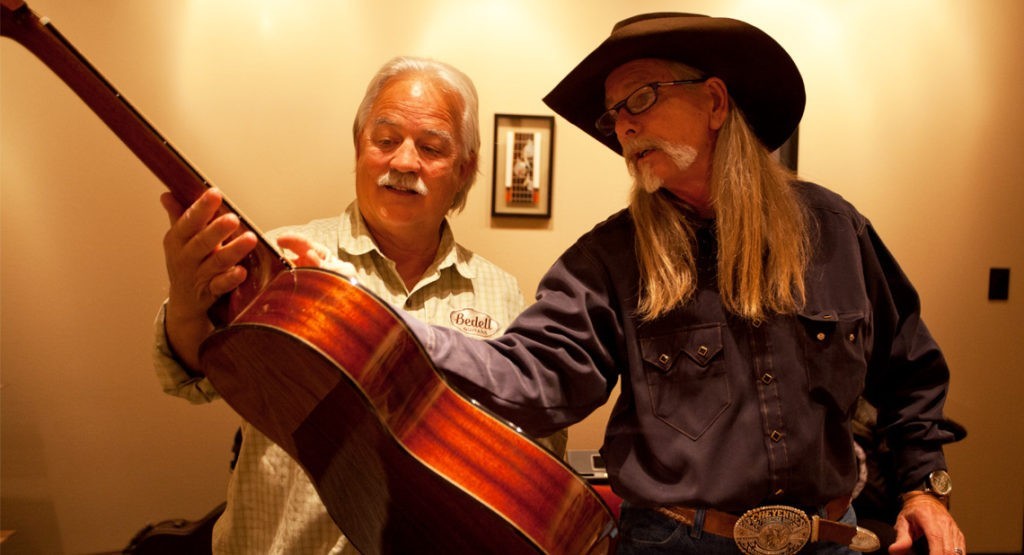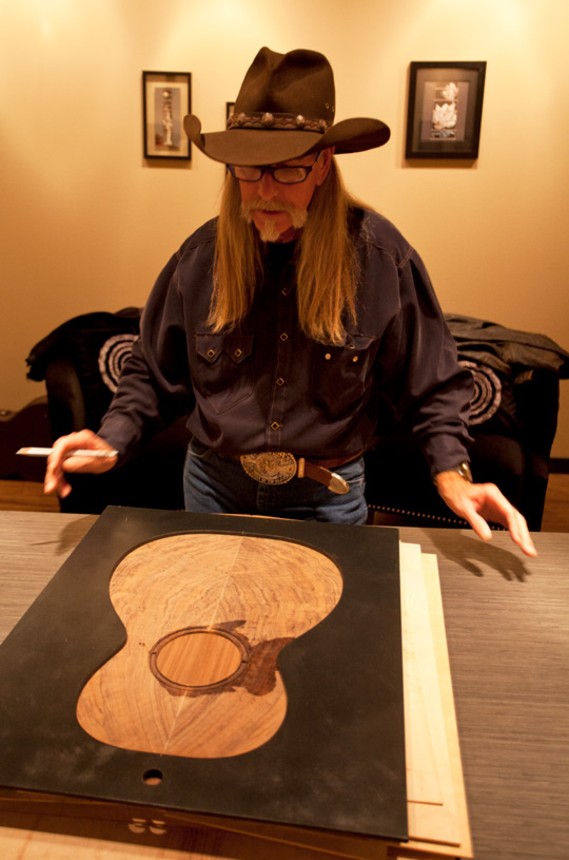Bedell Guitars Interview with Dean Dillon

BY MICHAEL ECK
“Tennessee Whiskey.” You know it. You love it.
David Allan Coe recorded it as the title track of a 1981 album, in a take every bit as shaggy, mercurial and charismatic as the man himself. ‘Ol Possum, George Jones, took it to #2 in 1983. And Chris Stapleton’s ubiquitous, blues-inflected vamp, released in 2015, has conquered the world, garnering rarefied quadruple platinum status.
Dean Dillon, along with Linda Hargrove, wrote “Tennessee Whiskey.”
It is but one in a long line of standards stemming from Dillon’s pen, including George Strait chestnuts “Marina Del Rey,” “Ocean Front Property,” Nobody in His Right Mind Would’ve Left Her,” and Dillon’s personal favorite, “The Chair.”
But “Tennessee Whiskey,” even the laconic songwriter will admit, has been particularly good to him.
“Whiskey” is echoed in the title of a new documentary film about Dillon’s life and work, and is also the moniker for a Broadway musical currently in development.
Dillon was born in East Tennessee, but Music City called his name as a young man. Like so many, he’d seen The Beatles on The Ed Sullivan Show and knew immediately that he wanted to make music his life, so he hightailed it as soon as he could.
“I hitchhiked to Nashville in 1973,” he says. “I knew that’s where the music was, and I knew that’s where I was going.”
With his distinctive cowboy hat, long hair and handlebar moustache, Dillon had both a look and a sound. He was taking the requisite steps to stardom, but a chat with producer Tony Brown changed his path.
“I’d been on three or four labels—Capitol, RCA, Atlantic … I was having a lot of success with George Strait, and it just came to the point where I was getting #1 records on him and then I’d put something out and it’d go to #30.
The “defining moment,” Dillon says, came one day when he played Strait and Brown about 20 songs. They weren’t buying, but as Strait was walking out the door, he looked back and said, “Hey, I’ve heard about this one song you’ve got, ‘Easy Come, Easy Go.’ ”
Dillon responded, “Well, that’s the first single off my new album.”
Brown parried with, “I promise you a number one record if you give us that song.”
“I thought about it for a little bit,” Dillon says, “and I made a decision to quit making records. As a matter of fact, I walked down the street to Atlantic, and told them to stick a fork in me, I’m done.”
“I just wanted to focus on the writing aspect. I had three kids under the age of five, and it’s hard to be on the road all the time when you’ve got a young family. I wanted to devote my time to them, and it’s easy to do when you’re just writing songs.”
He’s been comfortable with the decision ever since. He still performs as much as he likes, and he can work with whomever he chooses.
Early on, for example, Dillon forged a special relationship with classic songsmith Hank Cochran.
“I met Hank in 1980, and to me he was the Elvis of songwriters. Of course, we started having huge success together. And one day he looked at me and he said, ‘Man, you’ve got a thousand melodies in you.’ I think that was the point that I realized I could carry my own weight with anybody. We just clicked so well. We had three number one records in a row. It was crazy, the kind of success we had.”
All Dillon’s learned over his years at the writing table and in recording studios, he now passes on, urging young artists in the right direction. Some, like The Voice winner Sundance Head, even land on the newly launched Dean Dillon’s Wildcatter Records.
Most of these kids,” the proud mentor says, “they’ve got game.”
Dillon, not surprisingly, writes with a guitar in his lap.
These days, it’s a very special Bedell nylon string, which he had a strong hand in creating four years ago.
“I’ve written tons of songs on this thing,” he beams.
“This guitar goes with me everywhere. It was custom-built for me, and what I do. I’m not a loud singer at all, and it’s a very quiet guitar. The neck was built according to my hands. The bridge was built according to my fingers. It was like getting measured for a pair of Lucchese boots.”
“I spent a day out in Bend, talking with the designers and luthiers. We went through the process of finding the wood, including some 150-year-old West Coast walnut. I loved it because of the look. Growing up in East Tennessee, I always thought walnut was the prettiest wood—when I’d see it at the sawmill or something, I’d be going, man, that stuff is beautiful.”
Dillon’s guitar—a 12-fret parlor soft cutaway, with turquoise and abalone appointments—is unique in many ways, not the least of which is a red cedar veneer soundboard beneath the figured walnut, for extra stability and added tonal qualities.
It also boasts a customized L.R. Baggs Lyric System, with an additional Anthem mic, to amplify Dillon’s signal onstage and in the studio.
“When you plug that thing in with those electronics, man, it’s just incredible. I play a whole step down in drop D, and when you hit a bass note on that thing, it’s just got all the bottom in the world. I love it.”
“I can’t tell you the musicians that have come up to me after I’ve played and said, ‘Where in the world did you get that guitar? The sound out of that guitar is incredible.’ ”
(Photos: Top, Dean Dillon and Tom Bedell in the Bedell Custom Shop in Bend, Oregon. Left, Dean Dillon admires a piece of walnut which will eventually become the top of his custom Bedell parlor guitar.)

